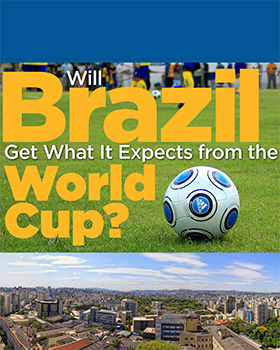June 10 – “Will Brazil Get What It Expects from the World Cup?”, a new policy brief released by the Atlantic Council’s Adrienne Arsht Center Latin America Center, argues that the World Cup’s most important bequest won’t be shiny new stadiums or the buffed up world-class reputation the country sought with the FIFA games. The author, well-known Brazilian expert and Arsht Center non-resident senior Brazil fellow Ricardo Sennes, instead argues that it will be the massive strengthening of Brazil’s civil society, which unleashed in anger at the game’s preparations.
Sennes’ comprehensive look at the World Cup’s challenges comes just two days before 3 billion fans will watch the debut match in São Paulo and seven years after Brazil won the right to host the games. But, importantly, this analysis of Brazil’s preparations to host the world’s largest single-event sporting competition looks into the future to the lessons learned for the country’s next mega-event challenge: the Olympic Games in 2016.
“Brazil is at a moment of profound transition. The “model” is in doubt,” said Peter Schechter director of the Adrienne Arsht Latin America Center. “President Lula’s administration was able to elevate millions of people from poverty, but the government neglected to prepare for the downcycle. Now, reduced demand for exports and lower commodity prices are exposing the burdens of a vast state of 200 million citizens,” he said.
“Local governments will have to address new social demands on the quality of life, reflected in the quality of public services and a path of inclusion for the new middle class, not only as consumers, but also as citizens. People will remember how the World Cup articulated a new narrative for Brazil based on a new political dynamic,” said Sennes.
The report’s main findings uncovered:
- An increasing pessimism about the lasting benefits of the World Cup. A concern visible across the nation is manifested in protests, newspaper editorials, nongovernmental organization activism on stadium cost overruns, and strikes, all with strident criticism of President Dilma.
- Preparations for the World Cup revealed a number of political and social disputes, which have brought the complexities of Brazil’s public policies to the forefront.
- The World Cup is a catalyst for significant change. Preparations unleashed a dynamic debate about the future of Brazil and a new development model that society envisions.
- The World Cup will produce an unexpected legacy of a deeply strengthened democracy. Mere material outcomes like structural investments, the influx of tourism, and an enhanced international image do not adequately encapsulate the World Cup’s lasting legacy.
- And Brazil’s future. Attitudes toward the World Cup will become a narrative for October’s presidential election.
“This policy brief is just the start of our center’s work on Brazil. This research strengthens understanding of Brazil’s current domestic situation, as well as the effect the World Cup will have on Brazil’s relationship with Latin America, the United States, and Europe,” said Jason Marczak, deputy director of the Adrienne Arsht Latin America Center.
“With Brazil set to host the 2016 Summer Olympics in just two years, this brief adds a new dimension to a timely debate with insight on the long-term imprint the World Cup will have on the nation,” he said.
The Adrienne Arsht Latin America Center is dedicated to broadening awareness of the transformational political economic and social changes throughout Latin America. Follow the Adrienne Arsht Latin America Center on Twitter @ACLatAm.
